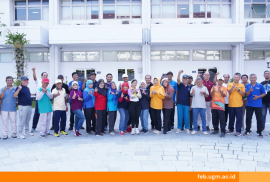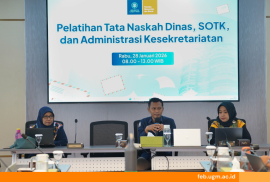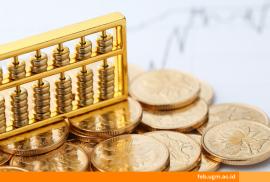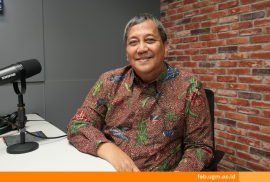1st Gadjah Mada International Conference on Islamic Economics and Development (GAMA ICIED) mengundang partisipasi menulis paper dengan tema “Recasting the Significance of Islamic Economics for Socioeconomics Development”.
Topik-topik yang dapat dipilih sebagai berikut:
- Islamic Economics as a Scientific Discipline
- Critical evaluations of the contribution of Islamic economics to development
- Problems with the current scope and methodology of Islamic economics
- Redefinition of Islamic economics’ scope and methodology and its consequences
- Further challenges in the development of Islamic economics as a discipline
- Microeconomic and macroeconomic models in Islamic economics
- The teaching of Islamic economics: Potentials and experiences
- Islamic Financial System and Global Economic Stability
- Islamic economic views of the global financial and the sovereign debt crises
- The significance of Islamic financial system for global economic stability
- Measuring the performance and stability of Islamic financial system
- Resilience and inclusiveness of Islamic financial services industry
- Islamic vs. conventional monetary and macroprudential policies
- Risk management under a mixed system of Islamic and conventional finance
- Growth, Inequality and Institutions
- Growth and inequality from an Islamic perspective
- Islamic socioeconomic institutions and the growth and inequality dynamics
- The role of fiscal policy to increase growth and reduce inequality
- Social capitals and their impact on economic productivity
- Governance, property right, competition, entrepreneurship and innovation
- Resource gap, external public/private debts and development
- Sectoral policies and the performance of primary, secondary and tertiary sectors
- The problem of corruption and its direct and indirect consequences
- Prospects and challenges of small and medium enterprises (SMEs)
- Trade Agreements and Development
- International trade and free trade agreements from an Islamic perspective
- Free trade agreements, openness and economic welfare in developing economies
- Prospects and challenges of cooperation among the OIC member countries
- Pursuing Development amidst Regional Instability
- Peace and conflict resolution from an Islamic perspective
- Causes and consequences of social and political conflicts
- The political economy of refugee migration
- Handling refugees: Experiences from different countries
- Post-conflict stabilization and reconstruction
- Labor and Social Justice
- The nature and significance of labor and employment in Islam
- Behavior in the labor market and its determinants
- The effect of individual characteristics on labor market outcomes
- Labor market and labor organizations
- Government regulations and social justice in the labor market
- Education, Health and Human Development
- Human development in Islam: Basic concepts and measurements
- The significance of education and health for development
- Challenges in the provision of education and health services
- Impact evaluations of education, health and human development programs
- Madrasah vs. school: Choice, outcome and return to education
- The roles of government: From regulation to financing
- Family and the Society
- The roles of family as the building block of the society
- Economic hardship and the life of families
- Family background and the opportunities for children
- Family decision making and economic behaviors in different markets
- The importance of family inheritance institutions for the economy
- Disputes about family inheritance: Causes and consequences
- The impacts of government policies and regulations
- Tobacco and Poverty Alleviation
- Tobacco consumption from an Islamic perspective
- Consumption of tobacco among the poor
- Private and social costs of tobacco consumption among the poor
- Evaluations of policies and regulations with respect to tobacco consumption
- Resource Use and the Environment
- Islamic perspectives on the environment: Basic concepts and measurements
- Causes and consequences of unsustainable environment exploitation
- Evaluations of policies and regulations related to environment exploitation
- Climate change and socioeconomic development
- The political economy of natural disaster
- Islamic Redistributive Schemes
- The significant of zakah, waqaf and other voluntary for poverty alleviation
- Challenges faced in zakah and waqaf collection and distribution
- Empirics on the determinants of behavior with regard to zakah and waqaf
- The causes and consequences of zakah and waqaf disputes
- The impacts of policies and regulations related to zakah and waqaf
Tanggal-tanggal penting:
- Batas akhir pengiriman abstrak: 6 Februari 2016
- Pengumuman abstrak yang diterima: 13 Februari 2016
- Batas akhir pengiriman naskah: 19 Maret 2016
- Pengumuman naskah yang diterima: 26 Maret 2016
- Konferensi: 12 Mei 2016
Pedoman dan tatacara penulisan naskah dapat dilihat di http://gamaicied.feb.ugm.ac.id.
Acara ini terselenggara atas kerjasama: Fakultas Ekonomika dan Bisnis UGM (FEB UGM), Sekolah Pascasarjana UGM (SP UGM), Masyarakat untuk Kemajuan Ekonomi Islam (SAIES), and Asosiasi Ekonom Islam Indonesia (IAEI). Informasi selengkapnya dapat menghubungi: Akhmad Akbar Susamto, email akhmad.susamto@ugm.ac.id atau kunjungi website http://gamaicied.feb.ugm.ac.id




